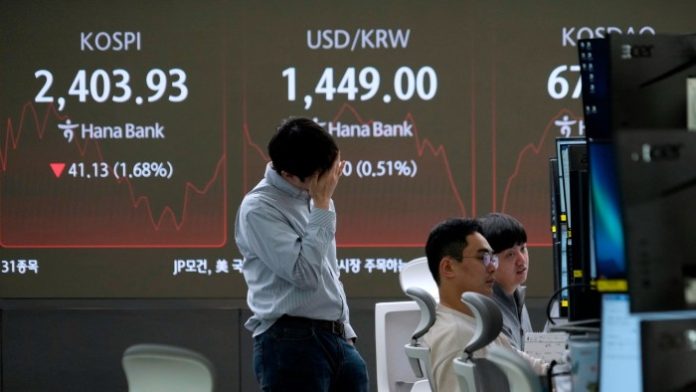Unlock the Editor’s Digest for free
Roula Khalaf, Editor of the FT, selects her favourite stories in this weekly newsletter.
The US dollar’s status as a haven for global capital could come under threat from erratic policymaking and rising trade barriers, fund managers have warned.
On Friday the currency fell to a three-year low against the euro, extending a slide that started last week after President Donald Trump announced steep “reciprocal” tariffs on US trading partners.
The moves triggered alarm among investors, who warned of a “tectonic shift” for the global economy if the dollar could no longer be relied upon to provide a refuge during periods of market volatility.
“There is 1744445650 a very good case for the end of American dollar exceptionalism,” said Bob Michele, chief investment officer of JPMorgan Asset Management, with $3.6tn under management.
For decades, the relative stability of the US economy has allowed the dollar to function as the world’s reserve currency — held by central banks around the globe.
That has permitted the US to borrow at low cost and finance “twin deficits” in the country’s current account and its government budget.
But a simultaneous sell-off in equities, bonds and the dollar in recent days, prompted by the president’s aggressive trade agenda, point to a loss of faith in US assets among international investors, money managers said.
“Trump’s chaotic tariff policy undermines the United States’ position as a safe haven,” said Bert Flossbach, the co-founder and chief investment officer of Flossbach von Storch, Germany’s largest independent asset manager.
“There is certainly a possibility that increased policy uncertainty in the US could lead to shifts in the dollar’s use in the global economy,” said Brad Setser, a fellow at the Council on Foreign Relations.
Edward Fishman, author of Chokepoints, a book on US economic warfare, said that in addition to Trump’s tariffs, the president’s threats to the rule of law and the Fed’s independence may also be damaging the dollar’s allure.
He predicted that over time this could result in a shift to a “multi-polar” system in which currencies, including the euro, play a larger role.
The dollar slump is particularly unusual because global financial stress typically strengthens the currency, as investors rush to dollar-denominated assets such US Treasury bonds that are perceived to be havens.
Economists also said that the currency of any country that imposed import duties was expected to strengthen.
Mike Riddell, fixed income portfolio manager at Fidelity International, said the recent sharp move higher in longer-dated government bond yields, coupled with a weaker US dollar, looks like “good old capital flight”.
However, economic advisers to the US president have in the past emphasised the costs that have come with a strong dollar.
Stephen Miran, chair of Trump’s Council of Economic Advisers, argued before the president’s inauguration that the dollar’s status as a world reserve currency had artificially inflated the exchange rate, undermining the global competitiveness of US manufacturing.
Economists have disputed Miran’s argument and raised concerns that his reasoning could lead the Trump administration to take further steps to depress the value of the dollar.
Michael Krautzberger, global CIO of fixed income at Allianz Global Investors, said: “The more the conflict escalates, people think, what could be the next steps?”






